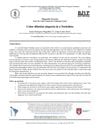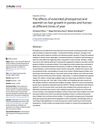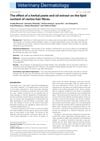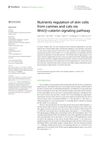 51 citations,
November 2005 in “Journal of Medical Primatology”
51 citations,
November 2005 in “Journal of Medical Primatology” Alopecia in captive rhesus macaques is affected by season, sex, age, housing, and stress, with complex links between stress hormones and hair loss.
 9 citations,
July 1995 in “Veterinary Clinics of North America: Small Animal Practice”
9 citations,
July 1995 in “Veterinary Clinics of North America: Small Animal Practice” The document concludes that hair loss in cats is caused by various factors, including allergies, mites, infections, and hormonal issues, with treatments varying accordingly.
 November 2022 in “Brazilian journal of veterinary pathology”
November 2022 in “Brazilian journal of veterinary pathology” The Yorkshire terrier has a genetic hair loss condition not improved by treatment.
 14 citations,
January 2020 in “PloS one”
14 citations,
January 2020 in “PloS one” Timing of light therapy affects horse coat growth, with photoperiod being crucial.
 1 citations,
February 2021 in “Animal feed science and technology”
1 citations,
February 2021 in “Animal feed science and technology” Organic selenium may offer better retention and less waste in puppies.
 1 citations,
January 2006 in “Elsevier eBooks”
1 citations,
January 2006 in “Elsevier eBooks” The conclusion is that different types of hair loss in dogs and cats can be cosmetic or serious, and affected animals should not be bred.
 17 citations,
November 2013 in “American Journal of Primatology”
17 citations,
November 2013 in “American Journal of Primatology” Different monkey species in a lab showed varying levels of hair loss due to factors like type, sex, age, season, and living conditions.
 4 citations,
January 2007 in “Australian Veterinary Journal”
4 citations,
January 2007 in “Australian Veterinary Journal” A horse's sudden hair loss was caused by an allergic reaction to a coat conditioning powder.
 23 citations,
March 1989 in “The Veterinary clinics of North America. Food animal practice”
23 citations,
March 1989 in “The Veterinary clinics of North America. Food animal practice” Llamas often have skin issues like mange, bacterial infections, and allergies, with some treatable by zinc.
 98 citations,
February 2007 in “Seminars in Cell & Developmental Biology”
98 citations,
February 2007 in “Seminars in Cell & Developmental Biology” Androgens can both stimulate and cause hair loss, and understanding their effects is key to treating hair disorders.
22 citations,
May 2019 in “Animals” High hair cortisol levels indicate stress in cows due to poor shelter conditions and health issues.
 January 2020 in “Veterinary world/Veterinary World”
January 2020 in “Veterinary world/Veterinary World” The natural topical treatment improved rabbits' skin and hair condition.
 8 citations,
February 2005 in “Veterinary dermatology”
8 citations,
February 2005 in “Veterinary dermatology” Chesapeake Bay retrievers' hair loss is likely a breed-specific, hereditary condition linked to abnormal steroid levels and distinct skin changes.
 23 citations,
January 2010 in “Journal of Medical Primatology”
23 citations,
January 2010 in “Journal of Medical Primatology” Hair loss in Rhesus macaques may be caused by a skin allergy-related condition.
1 citations,
April 2018 in “Journal of dairy science” Dairy cows' skin and hair follicles change size and growth phase around the time they give birth.
1 citations,
August 2023 in “Animals” Chimp Haven uses a special system to check and improve the well-being of their chimpanzees, which could help other animal sanctuaries too.
 12 citations,
July 2015 in “Veterinary Dermatology”
12 citations,
July 2015 in “Veterinary Dermatology” Microneedling helped two Pomeranian dogs with a hair growth disorder grow back 90% of their fur in 12 weeks, and the results lasted for a year.
 2 citations,
March 2017 in “Veterinary dermatology”
2 citations,
March 2017 in “Veterinary dermatology” Herbal paste and oil extract might improve dog hair quality by retaining lipids.
 September 2016 in “Elsevier eBooks”
September 2016 in “Elsevier eBooks” Different types of hair loss in dogs and cats have various causes and treatments, with outcomes ranging from good to uncertain.
 41 citations,
January 2020 in “BioMed Research International”
41 citations,
January 2020 in “BioMed Research International” Micrografts improve hair density and thickness without side effects.
 4 citations,
April 2016 in “American Journal of Primatology”
4 citations,
April 2016 in “American Journal of Primatology” Where a rhesus macaque used to live can affect its chances of getting alopecia later in life, and females are more likely to be affected than males.
 September 2024 in “Journal of Investigative Dermatology”
September 2024 in “Journal of Investigative Dermatology” A new tool can analyze hair to detect changes due to hormones, genetics, and aging.
 January 2011 in “Elsevier eBooks”
January 2011 in “Elsevier eBooks” Alopecia in animals can be hereditary, congenital, or acquired, with treatments and outcomes varying widely.
 10 citations,
March 2015 in “American journal of primatology”
10 citations,
March 2015 in “American journal of primatology” Ingesting Leucaena leucocephala caused hair loss and increased infant mortality in ringtailed lemurs.
 29 citations,
June 2005 in “Journal of Zoo and Wildlife Medicine”
29 citations,
June 2005 in “Journal of Zoo and Wildlife Medicine” Most hair loss in captive rhesus macaques is likely due to environmental and behavioral factors.
 10 citations,
November 2015 in “American Journal of Primatology”
10 citations,
November 2015 in “American Journal of Primatology” Monkeys with more anxious or inhibited temperaments tend to have less hair loss.
 1 citations,
July 2022 in “Frontiers in Microbiology”
1 citations,
July 2022 in “Frontiers in Microbiology” MSM supplementation in kittens improves hair quality and growth rate without harming their health.
 11 citations,
February 2011 in “Current Zoology”
11 citations,
February 2011 in “Current Zoology” About 20% of Japanese macaques had head alopecia, and stress and environment might cause hair loss.
 20 citations,
July 2020 in “Expert Opinion on Biological Therapy”
20 citations,
July 2020 in “Expert Opinion on Biological Therapy” Using micro-needling, low-level laser therapy, and platelet-rich plasma together significantly improves hair growth in people with hair loss.
 February 2025 in “Frontiers in Veterinary Science”
February 2025 in “Frontiers in Veterinary Science” Certain nutrients like keratin, egg yolk, and fish collagen may help pets regrow hair.


























